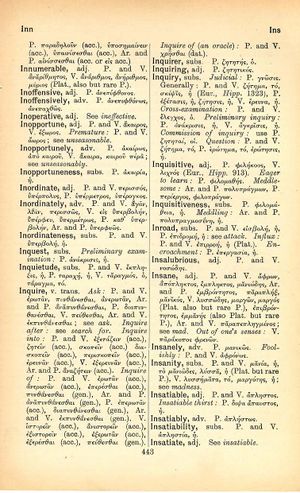insane
καλῶς γέ μου τὸν υἱὸν ὦ Στιλβωνίδη εὑρὼν ἀπιόντ' ἀπὸ γυμνασίου λελουμένον οὐκ ἔκυσας, οὐ προσεῖπας, οὐ προσηγάγου, οὐκ ὠρχιπέδισας, ὢν ἐμοὶ πατρικὸς φίλος → Ah! Is this well done, Stilbonides? You met my son coming from the bath after the gymnasium and you neither spoke to him, nor kissed him, nor took him with you, nor ever once felt his balls. Would anyone call you an old friend of mine?
English > Greek (Woodhouse)
adj.
P. and V. ἄφρων, ἀπόπληκτος, ἔμπληκτος, μανιώδης, Ar. and P. ἐμβρόντητος, παραπλήξ, μανικός, V. λυσσώδης, μαργῶν, μαργός (Plat. also but rare P.), ἐπιβρόντητος, ἐμμανής (also Plat. but rare P.), Ar. and V. παραπεπληγμένος; see mad. Out of one's senses: V. παράκοπος φρενῶν.
Latin > English (Lewis & Short)
insānē: adv., v. insanus.
Latin > French (Gaffiot 2016)
īnsānē¹⁴ (insanus), follement, d’une manière insensée : Pl. Curc. 179 || prodigieusement : *Pl. Mil. 24, v. Varro L. 7, 86 || -nius Hor. S. 1, 10, 34 ; -nissime Aug. Ep. 69, 2.

